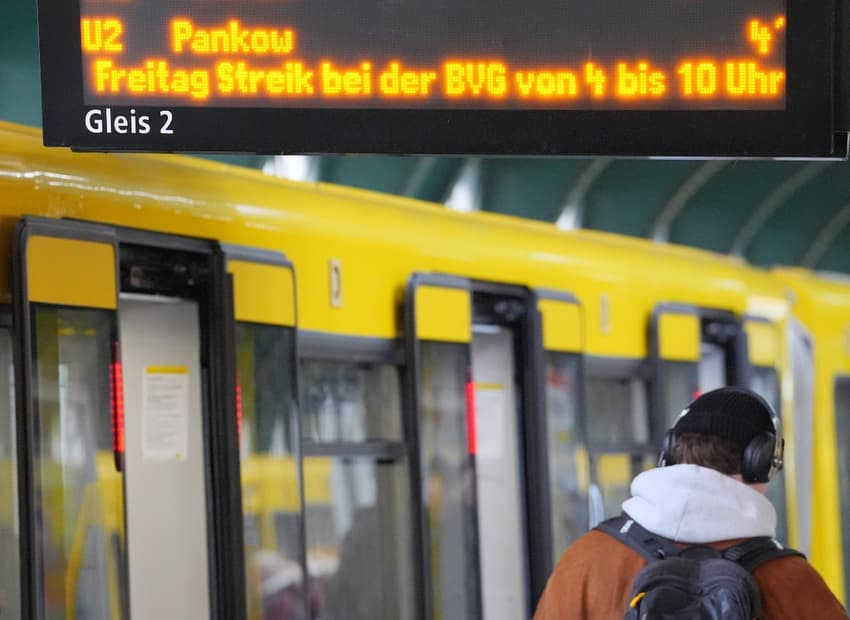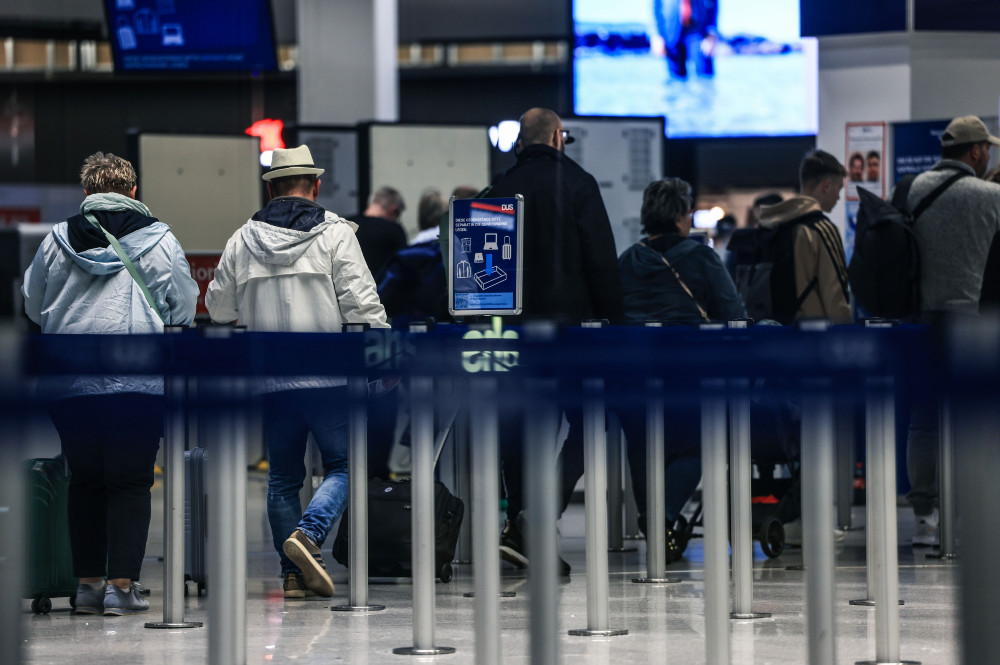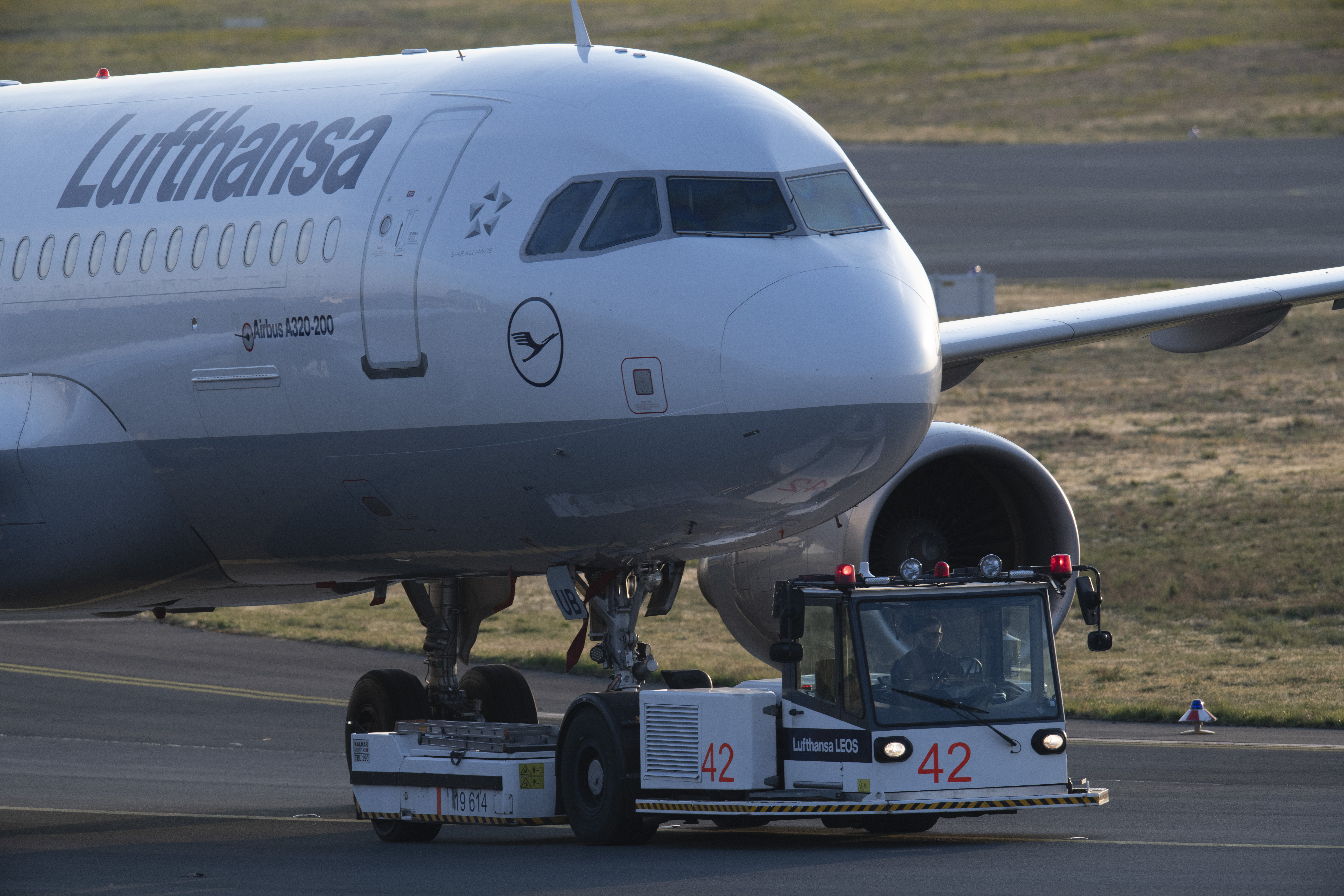Public transport to hospitals: Which strikes are coming up in Germany?

Germany has seen a wave of strikes in recent weeks. Amid expiring wage agreements and ongoing collective bargaining, several sectors could continue to see work walk-outs.
Germany is in strike mode: a five-day strike in long-distance and regional transport had barely ended on Monday morning when another wave of actions was announced.
Warning strikes at German airports on Thursday have caused thousands of flights to be cancelled, and on Friday local transport strikes will see U-Bahn, bus and tram transport come to a halt in many parts of the country.
Various industries are striking due to ongoing disputes over wage and working conditions - and the walk-outs look set to continue into the coming months as unionised workers fail to negotiate deals with their employers.
What’s the state of negotiations for unionised industries in Germany - and how likely are they to down their tools in the push for their employers to meet their demands.
Airport security staff
Verdi has called on employees of private security services at eleven airports not to work on Thursday. Strikes are to take place at Hamburg, Bremen, Hanover, Berlin, Cologne, Düsseldorf, Leipzig, Dresden, Erfurt, Frankfurt/Main and Stuttgart airports. Munich Airport and some smaller airports are to be exceptions.
Aviation security staff work at passenger, baggage and staff checkpoints, mostly on behalf of the Federal Police. Verdi is negotiating with the Federal Association of Aviation Security Companies (BDLS) for around 25,000 employees nationwide.
The strike will last one full day - with operations set to resume on Friday - but future actions are possible if employee demands aren’t met. This is, however, the first action since spring 2023, when strikes over working conditions also paralysed flight traffic at several airports.
READ ALSO: Tens of thousands affected by German airport security staff strike

Passengers queue on Thursday at Düsseldorf's airport, where some flights were still operating. Photo: picture alliance/dpa | Oliver Berg
Public transport
A warning strike in local public transport continues on Friday: Verdi has called on transport workers in all local bus, tram, U-Bahn and ferry services in almost all 16 states to take part. Bavaria is excluded because there are currently no negotiations there. In Berlin, the strike will also be limited to the morning.
Nevertheless, passengers in many regions must be prepared for far-reaching restrictions on public transport. According to Verdi, more than 130 municipal companies in around 80 cities and around 40 districts with a total of 90,000 employees are affected by the parallel wage negotiations in public transport.
READ ALSO: Where will public transport in Germany be affected by strikes on Friday?
Long distance and regional train services
The wage dispute between Deutsche Bahn and the German Train Drivers' Union (GDL) will continue for the next few weeks without further strikes as the two parties resume negotiations.
GDL announced a pause on strikes until at least March 3rd following a ‘peace agreement’ reached between the two parties on Sunday, when they ended a planned six-day strike a day early.
READ ALSO: Why are German train drivers launching more strike actions?
University hospital doctors
University hospital doctors also recently stopped work for a day. Several thousand doctors took part in a warning strike organized by the Marburger Bund union on Tuesday. According to the union, patients had to be prepared for longer waiting times in some cases. Non-urgent operations were also postponed.
The more than 20,000 doctors at the 23 state-owned university hospitals across Germany were called out. With no wage agreement in sight, another action could be on the horizon.
Lufthansa
Warning strikes cannot be ruled out in the Lufthansa Group either. The cabin crew union Ufo has unilaterally broken off salary negotiations for around 18,000 flight attendants at the parent company, as Ufo announced on Wednesday.
The union could be considering strike action, pending a decision by Lufthansa’s wage commission.

A Lufthansa plane takes off from Frankfurt. Photo: picture alliance/dpa | Boris Roessler
Retail
It is still unclear how the deadlocked wage disputes in the retail, wholesale and foreign trade sectors will continue.
Accompanied by numerous warning strikes at individual retail stores and businesses, negotiations have been going on for several months - in some collective bargaining areas since April 2023.
Next collective bargaining negotiations around the corner
Between December 2023 and December 2024, collective wage agreements agreed by the DGB trade unions alone will expire for almost twelve million employees, according to the collective bargaining archive of the Economic and Social Science Institute (WSI) at the Hans Böckler Foundation in Düsseldorf.
In spring, for example, the collective agreements in the printing industry (109,000 employees), the construction industry (731,000) and the temporary work sector (700,000) will end.
In June, the current collective agreements in the chemical industry (585,000) and the catering industry (79,000) will expire.
Collective bargaining in the metal and electrical industry, the largest collective bargaining sector in Germany with over 3.6 million employees, will begin in September 2024. Finally, the collective agreements for the public sector at federal and municipal level (2.4 million employees) will expire at the end of 2024.
Why employees could have the upper hand
Wage expert Hagen Lesch from the Institut der Deutschen Wirtschaft (IW) expects "conflict-laden wage negotiations” in the coming months in which employees have more bargaining power than in previous years.
He said that employees have a leg up in negotiations this year due to the shortage of skilled or in some cases even general labor.
READ ALSO: The strikes that could hit life in Germany in 2024
"This is leading to a new self-confidence and a greater willingness to stand up for their own interests. This could actually lead to more warning strikes."
The main demand of the trade unions is to increase real wages, wrote Lesch in a recently published analysis.
"As the inflation compensation premium has already been largely exhausted, this instrument cannot make it any easier to reach a compromise,” he wrote, referring to the one-off inflation bonuses which many companies have recently offered their employees.
According to Lesch, whether the level of conflict in 2024 will be as high as it was in 2023 also depends on employers' willingness to compromise.
However, most strikes in Germany are called by smaller companies and the public barely takes notice, Schulten said.
Even strikes in large collective bargaining sectors such as the construction industry, the chemical industry or the metal and electrical industry are hardly paid attention to by the general public, he said.
However, strikes in the transport sector or public services are different, seeing that they largely uproot people’s daily lives and routines.
Comments
See Also
Germany is in strike mode: a five-day strike in long-distance and regional transport had barely ended on Monday morning when another wave of actions was announced.
Warning strikes at German airports on Thursday have caused thousands of flights to be cancelled, and on Friday local transport strikes will see U-Bahn, bus and tram transport come to a halt in many parts of the country.
Various industries are striking due to ongoing disputes over wage and working conditions - and the walk-outs look set to continue into the coming months as unionised workers fail to negotiate deals with their employers.
What’s the state of negotiations for unionised industries in Germany - and how likely are they to down their tools in the push for their employers to meet their demands.
Airport security staff
Verdi has called on employees of private security services at eleven airports not to work on Thursday. Strikes are to take place at Hamburg, Bremen, Hanover, Berlin, Cologne, Düsseldorf, Leipzig, Dresden, Erfurt, Frankfurt/Main and Stuttgart airports. Munich Airport and some smaller airports are to be exceptions.
Aviation security staff work at passenger, baggage and staff checkpoints, mostly on behalf of the Federal Police. Verdi is negotiating with the Federal Association of Aviation Security Companies (BDLS) for around 25,000 employees nationwide.
The strike will last one full day - with operations set to resume on Friday - but future actions are possible if employee demands aren’t met. This is, however, the first action since spring 2023, when strikes over working conditions also paralysed flight traffic at several airports.
READ ALSO: Tens of thousands affected by German airport security staff strike

Public transport
A warning strike in local public transport continues on Friday: Verdi has called on transport workers in all local bus, tram, U-Bahn and ferry services in almost all 16 states to take part. Bavaria is excluded because there are currently no negotiations there. In Berlin, the strike will also be limited to the morning.
Nevertheless, passengers in many regions must be prepared for far-reaching restrictions on public transport. According to Verdi, more than 130 municipal companies in around 80 cities and around 40 districts with a total of 90,000 employees are affected by the parallel wage negotiations in public transport.
READ ALSO: Where will public transport in Germany be affected by strikes on Friday?
Long distance and regional train services
The wage dispute between Deutsche Bahn and the German Train Drivers' Union (GDL) will continue for the next few weeks without further strikes as the two parties resume negotiations.
GDL announced a pause on strikes until at least March 3rd following a ‘peace agreement’ reached between the two parties on Sunday, when they ended a planned six-day strike a day early.
READ ALSO: Why are German train drivers launching more strike actions?
University hospital doctors
University hospital doctors also recently stopped work for a day. Several thousand doctors took part in a warning strike organized by the Marburger Bund union on Tuesday. According to the union, patients had to be prepared for longer waiting times in some cases. Non-urgent operations were also postponed.
The more than 20,000 doctors at the 23 state-owned university hospitals across Germany were called out. With no wage agreement in sight, another action could be on the horizon.
Lufthansa
Warning strikes cannot be ruled out in the Lufthansa Group either. The cabin crew union Ufo has unilaterally broken off salary negotiations for around 18,000 flight attendants at the parent company, as Ufo announced on Wednesday.
The union could be considering strike action, pending a decision by Lufthansa’s wage commission.

Retail
It is still unclear how the deadlocked wage disputes in the retail, wholesale and foreign trade sectors will continue.
Accompanied by numerous warning strikes at individual retail stores and businesses, negotiations have been going on for several months - in some collective bargaining areas since April 2023.
Next collective bargaining negotiations around the corner
Between December 2023 and December 2024, collective wage agreements agreed by the DGB trade unions alone will expire for almost twelve million employees, according to the collective bargaining archive of the Economic and Social Science Institute (WSI) at the Hans Böckler Foundation in Düsseldorf.
In spring, for example, the collective agreements in the printing industry (109,000 employees), the construction industry (731,000) and the temporary work sector (700,000) will end.
In June, the current collective agreements in the chemical industry (585,000) and the catering industry (79,000) will expire.
Collective bargaining in the metal and electrical industry, the largest collective bargaining sector in Germany with over 3.6 million employees, will begin in September 2024. Finally, the collective agreements for the public sector at federal and municipal level (2.4 million employees) will expire at the end of 2024.
Why employees could have the upper hand
Wage expert Hagen Lesch from the Institut der Deutschen Wirtschaft (IW) expects "conflict-laden wage negotiations” in the coming months in which employees have more bargaining power than in previous years.
He said that employees have a leg up in negotiations this year due to the shortage of skilled or in some cases even general labor.
READ ALSO: The strikes that could hit life in Germany in 2024
"This is leading to a new self-confidence and a greater willingness to stand up for their own interests. This could actually lead to more warning strikes."
The main demand of the trade unions is to increase real wages, wrote Lesch in a recently published analysis.
"As the inflation compensation premium has already been largely exhausted, this instrument cannot make it any easier to reach a compromise,” he wrote, referring to the one-off inflation bonuses which many companies have recently offered their employees.
According to Lesch, whether the level of conflict in 2024 will be as high as it was in 2023 also depends on employers' willingness to compromise.
However, most strikes in Germany are called by smaller companies and the public barely takes notice, Schulten said.
Even strikes in large collective bargaining sectors such as the construction industry, the chemical industry or the metal and electrical industry are hardly paid attention to by the general public, he said.
However, strikes in the transport sector or public services are different, seeing that they largely uproot people’s daily lives and routines.
Join the conversation in our comments section below. Share your own views and experience and if you have a question or suggestion for our journalists then email us at [email protected].
Please keep comments civil, constructive and on topic – and make sure to read our terms of use before getting involved.
Please log in here to leave a comment.